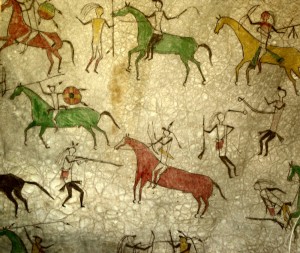 All writers have 1 thing in common. It doesn’t matter if they are writing fiction or nonfiction, books or articles, brochures or blog posts–they all have 1 thing in common.
All writers have 1 thing in common. It doesn’t matter if they are writing fiction or nonfiction, books or articles, brochures or blog posts–they all have 1 thing in common.
Every writer is trying to tell a story.
From long before mankind knew how to write, they were telling stories. Stories to teach, stories to entertain, stories to make the world feel a little bit smaller–or a whole lot bigger. Stories are the way humans relate to one another.
Story-telling has changed over the years. Families and friends used to pass down stories by word-of-mouth, from generation to generation. Then cultures began to develop ways of writing these stories down from cave paintings to hieroglyphics and eventually on to the modern written language.
Storytellers began to share those stories with people beyond those closest to them. The art began to change. Stories were written on scrolls and then large bound books. Scribes painstakingly copied page after page of stories.
With the invention of the printing press (between 1440-1450), stories garnered an even bigger audience as books were made more readily available. And still, technology continued to change, making it easier for stories to be shared with those around the world.
In recent years, we’ve gone from enjoying the feel of a hardback book in our hands, turning pages as we greedily consume each story to the age of digital books. An entire library that fits in the palms of our hands.
Storytelling has changed over the years, but our spirit has not. Mankind still has the desire (whether they would admit it or not) to hear stories, to learn from stories, to be touched by the life of another. And, as writers, it is our job to meet that need.
 Writers craft stories that reach to the heart. While they hold the power to manipulate and cause change with the power of words, they take that responsibility seriously, instead challenging humanity to be the best that it can be, even in the face of the atrocities it is also capable of committing. Writers show the good, the bad, and the ugly–but they also provide hope and promise.
Writers craft stories that reach to the heart. While they hold the power to manipulate and cause change with the power of words, they take that responsibility seriously, instead challenging humanity to be the best that it can be, even in the face of the atrocities it is also capable of committing. Writers show the good, the bad, and the ugly–but they also provide hope and promise.
A writer who doesn’t understand the point of storytelling or who doesn’t understand their own reasons for telling a story will not reach the hearts of readers. They’re work may rise with the marketing avenues available to them, but it will also fall away quickly, forgotten.
Be the writer that changes hearts. Be the writer that challenges humanity. Be the writer that elevates storytelling to an art form.
What’s your story?




I love this! It’s so true everyone has a story to tell and that we can all learn from each other’s stories. A dear college writing professor once gave this advice, “You tell your story and I’ll get mine.” She was referring to getting personal in our essays because humans crave connection and as we read about other’s experiences, we tend to relate and learn more about ourselves.
Exactly! That professor is a wise woman.
yes, I agree we all have a story in us. Being a blogger I am working on my stories. I also would like to publish a book someday.
Keep working on your stories, Mary! I’m sure people will love to read them. 🙂
“Elevate storytelling to an art form.” I love that! I will try. 🙂
Great post! I think one of the most unfortunate consequences of our standardized education programs is that they hamper the creative expression of writing which can be so therapeutic.
Oh, I so agree with you on that. It’s one of the reasons I love homeschooling my kids!
Love this! We do all have a story! Mine would be how my life has been radically changed in so many ways. I am best known for the years of struggle with food and have enjoyed peace with food for so many years now.
I’m working on being the writer that changes hearts Ralene. I’ve found not only do I have A story, I have many stories that are ongoing. How do I choose just one?
Choosing which one(s) is all about seeking God’s path. We all have many stories inside of us, and deciding which ones God wants us to use to help others is definitely a process. Where does your passion lie? Share the stories that are in line with your passion!